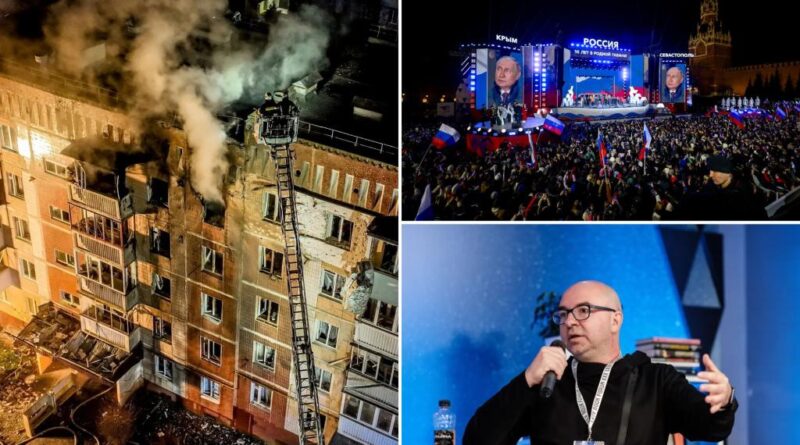Russia’s Invasion of Ukraine Reveals Its Obsession with Conquest

As 100,000 Russian soldiers invaded Ukraine on February 24, 2022, the international community quickly pointed the finger at one individual: Vladimir Putin. He was immediately assigned the roles of villain, dictator, and madman.
One year later, the International Criminal Court issued an arrest warrant against him, marking Putin as a wanted war criminal—a fate he rightly deserves. However, this war extends beyond his personal ambitions; it represents Russia’s conflict—deeply entrenched in a long-standing historical drive for conquest and control.
Russia may be perceived as a nation, but it originated as an aggressive empire that never fully developed a cohesive civic identity. Its history compels it to invade.
Out of compassion and a wish to protect ordinary citizens, we often direct our anger at Putin and his cohorts. Yet this focus comes at a price, as it diminishes the Russian people’s own agency.
Ironically, this dynamic is part of the social contract that has fortified the Kremlin’s control for decades. If the Russian populace is not accountable for their government’s deeds, for the military’s war crimes, or for the appropriated Ukrainian children, one must ponder, who is truly responsible?
While it’s difficult to attain genuine neutrality in polling under an authoritarian regime, insights from Russia’s independent Levada Center are among the most credible. The latest polls indicate that even if Putin were to support returning Ukrainian territories taken after 2022 for a peace agreement, 60% of Russians would reject such a notion.
A striking 75% of Russians view the idea of returning regions like Luhansk and Donetsk, which have been under occupation since 2014, as unacceptable.
These statistics unveil more than just current opinions—they reflect a mindset where aggression and territorial conquest are perceived as part of Russia’s inherent destiny. For many Russians, polling suggests that the concept of invading another nation to acquire land and subjugate its inhabitants does not even raise alarm.
Moscow promotes an “anti-colonial” narrative, presenting itself as a defender against both foreign and domestic adversaries. We in the West frequently subscribe to the belief that colonialism is something that transpires only abroad.
However, Russia operates as a colonial empire in every respect, with a structure aimed at siphoning resources from far-flung areas for the profit of Moscow.
Unlike many other empires, Russia’s methods do not rely on racial exploitation. Instead, they propagate a vicious “idea of sameness,” compelling those subjugated to abandon their own identities in favor of Russian identity.
Philosopher Volodymyr Yermolenko emphasizes that this “sameness” can be as brutally oppressive as racial segregation, although it may be less visible from an outside perspective.
In a web of deceit, Russia claims to “save lives” while killing, occupies to “liberate,” and professes to end imperialism through its own acts of colonization. This isn’t a malfunctioning system — it is the system.
While Moscow dispenses dreams of “greatness” to its citizens, it systematically exploits marginalized groups, particularly in resource-abundant regions such as the Caucasus and Siberia.
The Kremlin has expertly honed the narrative of victimhood, presenting itself as the “defender” against foreign treads. Time and again, however, it is Russia that has instigated aggression—seen in Georgia, Syria, and now Ukraine. In fact, Moscow has attacked or invaded nearly every neighboring nation at least once in the last century.
Language holds profound importance in describing Russia’s unlawful war against Ukraine. Oversimplifying it as merely ‘Putin’s war’ is dangerously misleading. The notion that ousting Putin would alter Russia’s actions is a fallacy.
Russia has pursued imperialistic desires through coercive measures for centuries, irrespective of leadership changes. Unless Russia and its populace critically engage with their historical legacy, the cycle of violence will persist.
The implications stretch far beyond the independence of Ukraine. This war signifies a critical junction for global security. Should Russia’s aggressive actions bear fruit, it will establish a perilous precedent that other authoritarian nations may interpret as encouragement. China and Iran are closely monitoring the West’s capacity to thwart aggression and restore deterrent measures.
As Jason Smart and Ivana Stradner noted in The Post, Moscow harbors ambitions to instigate chaos in the Balkans and “protect” its former territories such as Moldova, Georgia, or the Baltic States. The Kremlin continuously signals that it won’t halt its advances after Ukraine.
Ukraine is valiantly fighting for its existence with limited capabilities, while Russia possesses the economic resources and military strength to sustain this conflict. If we genuinely seek peace, we must equip Ukraine with the necessary tools for victory. Half-hearted efforts will only prolong this conflict and reinforce Russia’s belief in its potential for success.
Putin has made nuclear threats to intimidate the West into capitulation. However, a world where nuclear coercion succeeds is significantly more dangerous than one where it does not. When the U.S. and its allies remain resolute, authoritarian governments are less likely to overstep their boundaries.
President-elect Donald Trump stated: “Together, we will secure peace through strength and make America, and the world, safe again!”
He must honor this commitment, not just for Ukraine, but for our own future security. For the long-term stability of America and the global order that supports our prosperity, Ukraine must prevail.
If we falter in halting Moscow’s advances, we grant every aspiring conqueror the green light to fulfill their imperial ambitions, and it is merely a question of time before those ambitions reach our own borders.
Andrew Chakhoyan is an academic director at the University of Amsterdam and has served in the US Government at the Millennium Challenge Corporation



